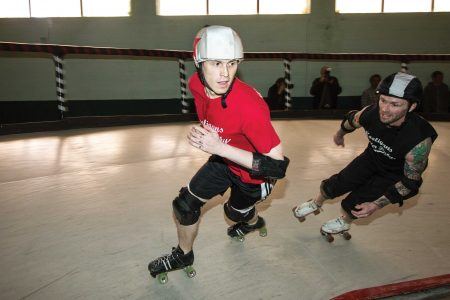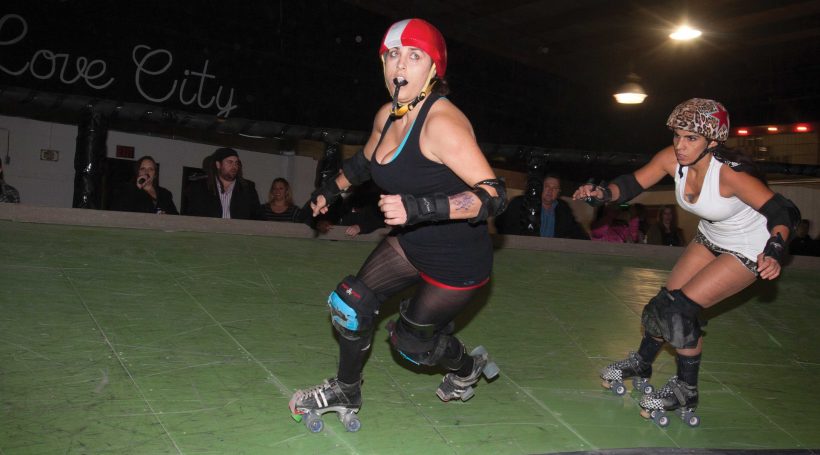As a kid, Melissa Morera dreamed of joining a roller derby team. Today, the 37-year-old Mullica Hill resident is proudly known as Mos Deathly, “the deffest jammer on the block,” thanks to a resurgence in the popularity of the sport.
“I always loved roller derby ever since I was a kid,” says Morera, president of South Jersey Derby Girls and Love City Roller Derby. “I used to watch it with my dad on Saturday mornings, and when it had a revival I joined a team. I ran track in college on a scholarship and always loved high-cardio competition, so I love the cardio aspect of roller derby.”
The sport’s revival is credited to the 2006 A&E television show “Rollergirls,” featuring the Texas roller derby league TXRD. “That brought the sport back. People realized it was a great way to make friends and get in shape. It has that full-contact thing that a lot of women were looking for,” says Morera. “It’s just a great sport that takes a lot of dedication and training.”
She loved it so much that she started the South Jersey Derby Girls league with her sister in 2006. Boasting 100 members, including men and women, the league competes in a flat-track league, practicing at the Deptford Skating Center. SJDG has four intra-league teams: the Big Rig Betties, Rollin Barren Bandits, Lipstick Militia and the Doomsday Dolls. Teams compete against other leagues, generally playing two games a month and practicing twice a week.
SJ roller derby leagues follow several rule sets, but most share some basic rules. Two five-member teams roller skate in the same direction around a track. During a series of short matchups called jams, both teams designate a jammer who scores points by lapping members of the opposing team. Teammates attempt to assist their own jammer while hindering the opposing jammer at the same time.
“It’s like football on skates without the ball,” says Morera.
Roller derby dates back to the 1930s, and by the ’40s the sport appeared in every state in the country with more than 5 million spectators. With colorful names and skimpy uniforms, fans find roller derby as much fun to watch as it is to play.
“People used to think it was fake and kitschy like fake wrestling,” explains Morera. “But now the sport is athletic, there’s nothing fake about it. People practice for hours and hours. We train very hard.”
Kids as young as 8 participate in junior leagues, and even robust seniors play. “I just saw pictures of a game where there was a 70-year-old gentleman and a man in his upper 50s was blocking like a 30-year-old,” says Morera. “The fan base is also made up of all ages. We even have a kids’ night for families. There are also a lot of people who used to watch roller derby in the ’70s. Our fans fit basically every demographic.”
At 42, Kim SantaMaria just joined the Boardwalk Brawlers in the Shore Points Roller Derby League for her first experience with roller derby. “I was on Facebook and something came up about roller derby – they just happened to be having a recruitment,” says the Galloway resident. “I remember watching roller derby in the ’70s, and I was always athletic. As a kid, I was the first BMX rider in Brigantine. I was the only girl on my baseball team. I played hockey, and I did gymnastics for eight years. I go to the gym, but to be on a team at 42 makes me feel good.
“I’m technically not a team member until my recruitment is over. During recruitment they show you everything, from how to hit, fall and jump. You take tests in endurance and skills after about three or four months. I can scrimmage with the team, but I can’t bout against other leagues yet. I can also pick out my name after recruitment, but there’s a national roster and if anyone has a particular name, I can’t use it.”
Jeffrey Weigold, 37, was introduced to roller derby in 2004 through a girlfriend, and he instantly wanted to play. But at the time, there weren’t any local leagues for men. The Clayton native decided if he wanted to play, he’d have to start his own men’s league.
“I started refereeing the girls in hopes that eventually other guys would come around,” he says. “Sure enough, the girls’ boyfriends started coming, and within two-and-a-half years, we had enough for a men’s team.”
So began the Hooligans, the Penn Jersey Roller Derby League’s men’s team that now has a roster of 18 guys. Using the moniker “Wags” – Weigold’s boyhood nickname – roller derby is his passion.
“It’s very rough,” he admits. “When you’re out there playing a game, everybody is screaming and yelling. You’re flying through the pack scoring points, and the crowd gets louder and louder. As tired as you are and as much pain as you’re in, you don’t feel any of it.”
 Weigold’s co-captain on the Hooligansis Sean Costello, 28, who grew up in Collingswood and Haddonfield. “I had always assumed roller derby was a woman’s sport. I’d seen a few games and always thought it was really cool but something I could never be a part of,” he says. “Then I discovered the co-ed roller derby team. I joined about two years ago.”
Weigold’s co-captain on the Hooligansis Sean Costello, 28, who grew up in Collingswood and Haddonfield. “I had always assumed roller derby was a woman’s sport. I’d seen a few games and always thought it was really cool but something I could never be a part of,” he says. “Then I discovered the co-ed roller derby team. I joined about two years ago.”
As the number of men’s teams has increased – teams now compete in Pennsylvania, New Jersey and New York – the caliber of play has also improved. Most leagues have men’s, women’s and co-ed teams. Costello insists the men are less aggressive when playing against women, but Morera says “bring it on.”
“Roller derby is a great equalizer, because men have a different center of gravity than we do,” she explains. “We can get really low and pop them off their skates easily, so it’s one of the few sports where women and men are on a level playing field.”
Nurse Ratchet is Costellos’ derby moniker, a nod to his profession as a nurse and his ability to fix things. “Names allow you to create a persona, an alter ego that you get to play under,” he says. “It’s like in old war movies where everyone has a nickname – it’s the same around here. We know each other’s real names, but I’m Ratchet to most people.”
Tara Begolly, 40, a.k.a. Neurotic Nightingale, just returned from a roller derby hiatus caused by injuries she received during a co-ed game. “I had taken a fall and injured my leg and tore the UCL [Ulnar Collateral Ligament] on my thumb. I was out of work for three months,” says the Lumberton Township mother of two. “I’m a nurse and I need my hands, but I missed roller derby because I really love skating. You only live once, and you might as well have a good time doing it.”
Her slogan, “she’s so crazy on her skates, she’ll send you to the psych ward,” harkens to her job as a nurse and her reputation as a fast skater. “I don’t want to offend anybody though with that slogan,” she adds.
Begolly joined the newly formed league, Atlantic Coast Roller Girls, largely because of their non-profit, charity-oriented approach. “It’s a great thing to get out there together as a team and give back,” she says. “For example, we just did the domestic violence walk in Lumberton, and we collected toys for Toys For Tots. We try to raise awareness of groups we support.”
Charity aside, roller derby can be an expensive hobby. “Our equipment costs about $200 a year, and dues range from $40 to $60 a month. It’s like having a gym membership,” says Morera.
The biggest expenses come through travel, but some sponsorships and fundraising offset a portion of those costs. “We have smaller companies that sponsor us, and we’re working on some major sponsors,” says Morera. “We just went to Puerto Rico for five days to play a team down there, and we brought a bunch of fans with us. Next year we are planning to go to France. We have tournaments throughout the year. Next year we have a huge, three-day event in Harrisburg with teams from all over the country.”
Events such as the upcoming one in Harrisburg come with jackpots. “It will be like a Super Bowl with a $20,000 jackpot that players can win,” says Morera.
While she hasn’t given up her day job yet – Morera owns an insurance marketing company with her husband – she also works part-time in the Derby Ink Gardens in Philadelphia. And she is a member of the semi-professional bank track team that practices there.
Begolly has passed her love of roller derby to her 17-year-old daughter, who is considering joining the team. But of course, safety is mom’s main goal. “We teach you how to fall and what you should be looking for because the hits are real. There’s no acting going on. You should keep yourself in shape. I love that there’s a lot of true athleticism out there. You need to work out – do some weight lifting and running for your endurance.
“We teach you how to hit. You are only allowed to hit in certain areas, no elbows getting thrown out and you’re not smacking anybody. You can do hip checks, what we call booty blocks, and you can hit with your shoulder. Part of the training is learning how to fall the right way. It’s a good stress reliever.”
Roller derby is one of eight sports being considered for one spot in the 2020 Olympic games. “I know people would love it to become an Olympic sport, but I think that’s wishful thinking,” acknowledges Costello. “It’s a home-grown sport, and the fact that it’s become so successful is due to the hard work of many individuals. I think the Olympics is many years off.”














